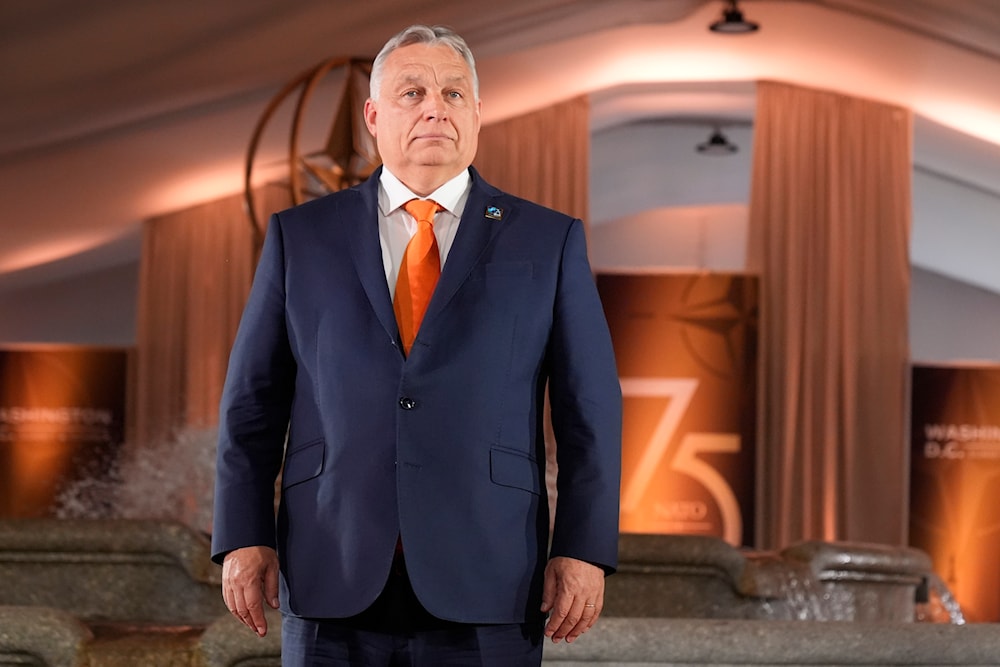Hungary's Orban says Trump has Russia-Ukraine peace plan if re-elected
The Hungarian prime minister has written a confidential letter to EU leaders after talking with Moscow and Beijing that the EU should resume direct diplomatic relations with Russia.
-

Hungary's Prime Minister Viktor Orban arrives at an event commemorating the 75th anniversary of NATO at the Andrew W. Mellon Auditorium at the NATO summit in Washington, on July 9, 2024. (AP)
After private negotiations with Republican candidate Donald Trump, Hungary's Viktor Orban declared that if he wins the US presidential election in November, he will quickly demand peace talks between Russia and Ukraine and that he has "well-founded plans" for achieving so.
According to Financial Times, the Hungarian prime minister wrote a confidential letter to EU leaders after consulting with Moscow and Beijing, suggesting that in order to find a peaceful end to the war in Ukraine, the EU should resume direct diplomatic relations with Russia and begin "high-level" talks with China.
In the letter, Orban added that the "general observation" based on his recent talks with presidents Volodymyr Zelensky of Ukraine, Xi Jinping of China, and Vladimir Putin of Russia was "that the intensity of the military conflict will radically escalate in the near future."
His visits with Trump, Xi, and Putin during the last two weeks while serving as the rotating president of the European Union startled his partners in the alliance and the bloc.
Orban visited Russia last week on a peace mission that began with his earlier visit to Kiev and continued to China. Sources familiar with the matter told the newspaper that the EU's legal service informed member states on Wednesday that Orban's actions violated agreements that prohibit any measures "which could undermine the achievement of the Union's objectives."
At the same time, the Hungarian leader has reportedly violated an EU provision that mandates all members to conduct foreign policy "unreservedly in a spirit of loyalty and mutual solidarity."
Read more: Hungary's Orban says EU wants war with Russia, dragging Europe with it
In the letter, Orban said to European Council President Charles Michel and other EU leaders, “We can expect no peace initiative coming from [Trump] until the elections. I can however surely state that shortly after his election victory, he will not wait until his inauguration, but will be ready to act as a peace broker immediately,” adding, “He has detailed and well-founded plans for this.”
According to Orban, this implies that the EU should prepare for the change in US policy and either accept the necessity of quick talks between Russia and Ukraine or assume greater accountability for financing Ukraine's defense.
In a February editorial piece published in the Financial Times, Ohio Senator JD Vance advocated for Europe to shoulder more of the responsibility for aiding Ukraine. On Monday, Trump announced Vance as his running mate.
Orban continued to say, “I am more than convinced that in the likely outcome of the victory of President Trump, the proportion of the financial burden between the US and the EU will significantly change to the EU’s disadvantage when it comes to the financial support of Ukraine.”
“Our European strategy in the name of transatlantic unity has copied the pro-war policy of the US,” Orban wrote, stressing, “We have not had a sovereign and independent European strategy or political action plan up to now. I propose discussing whether the continuation of this policy is rational in the future.”
He told EU leaders, “We can find a window of opportunity with a strong moral and rational basis to begin a new chapter in our policy . . . [and] make an effort to decrease tensions and/or create the conditions for a temporary ceasefire and/or start peace negotiations.”
Orban's assessment of Trump's peace proposal for Ukraine corresponds with a policy paper on the war authored by two of the former president's allies who are anticipated to assume crucial national security positions in his government should he win the US elections in November.
Read next: Trump vowed 'not to give a penny' to Ukraine, Orban says
The US should keep bolstering Ukraine's defenses, according to a plan by America First Policy Institute's Keith Kellogg and Fred Fleitz, but any further military assistance would be contingent on Kiev's participation in peace negotiations with Russia.

 4 Min Read
4 Min Read











